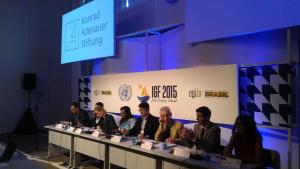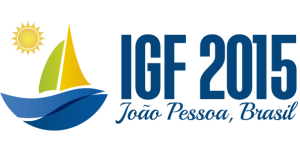Cybergovernance - Foundation Office Brazil
Event Reports
The UN Internet Governance Forum (IGF) was held from 9 to 13 November 2015 in the city of João Pessoa in Northeastern Brazil. More than 2,400 registered participants from over 100 countries attended the meeting to debate the future of the Internet. In addition to the on-site attendees, up to 5,000 virtual participants followed the debates online. Throughout the Forum, several events took place in ten different seminar rooms besides the main auditorium. More than 200 activities took place during the week, including workshops, seminars and plenary discussions. Together with the Institute for Technology & Society (ITS Rio), the Italian Parliament and the Brazilian Internet Steering Committee (CGI.br) the Brazil Office of the Konrad Adenauer Foundation (KAS) organized a workshop on the topic of fundamental rights on the internet. For ten years, the United Nations have been organizing IGF meetings, which take place in different counties all over the world. The main department - the Economic and Social Council (ECOSOC) of the United Nations is responsible for organizing these meetings with the objective of bringing together different governmental and non-governmental players to discuss current and upcoming opportunities and challenges in the context of the Internet. Special focus was dedicated to the issue of Internet governance and all topics related to the rights of Internet users. The IGF is an inclusive and transparent forum interested in promoting dialog about political issues of public interest regarding the Internet. Although the results of the Forum are not binding on the international community, the target is to achieve a consensus about organizing the general directions of the activities in further negotiations. Interested organizations, such as universities, were able to participate in many discussions online via video streaming. Thousands of people took advantage of this possibility.
During the 10th IGF meeting, a broad range of topics spanning from zero rating to network neutrality to freedom of expression online, cybersecurity and Internet economy was discussed. Many workshops also stressed the interrelation of human rights and fundamental freedom. One pressing issue was the online risks that children face. Privacy issues were also debated: several participants underlined that encryption and anonymity needed to be reinforced and agreements on the need for privacy, transparency and security issues had to complement and not compromise each other, so that the privileges of one person are not to the disadvantage of another individual. Furthermore, it was argued that civil society, government and the private sector must work together to ensure the necessary development of the Internet. The key instrument is, in this case, the so-called “multistakeholder process”, a method that aims to unite civil society, government and the private sector to consider the interests of all players to avoid unilateral actions by the strongest party.
The workshop organized by the KAS Foundation and its partners took place in this context on 9 November 2015 against the backdrop that Brazil is one of the world‘s first countries to implement legislation that guarantees Brazilian Internet users a wide range of rights. ITS Rio, one of the KAS Foundation’s partners, played an important role in the preparation of the so-called “Marco Civil”, as ITS participated in the co-creation of the law before its implementation and afterwards by defending it in the public sphere. Later on, the “Marco Civil” played a major role as a source of inspiration for laws in other countries such as those implemented by the Italian Parliament.
At the beginning of the workshop, the speakers shared their impressions and experiences evaluating how the new legislation will perform in the Italian and Brazilian context. They underlined the challenges regarding the physical infrastructure of the Internet. Even if the Internet constitutes an abstract, virtual space, its data and services depend on server computers that must be stationed somewhere in the real world. The data are communicated through a network, which also exists in the real world in the form of cable networks and so-called routers. Both components, computers and data network infrastructure are distributed in many countries all over the world. How should this be handled? Who is legally responsible in which situations? How can actors be held accountable if they are spread across many different countries? Which legislation applies where and which authority is responsible? It was mentioned that these issues would only become clear over time. However, the first steps have already been taken and the Internet users are the clear winner.
In the second part of the program, the participants discussed how we could promote global user-rights-oriented legislation. We received the information that the Italian Parliament and the European Parliament are in close contact to ensure the first step towards a European law. Yet the ambition is to establish a global legal structure. Referring to the “Magna Carta”, Sir Tim Berners Lee, one of the inventors of the Internet, made an appeal to use the UN process to guarantee the rights of users throughout the world. It is important to prevent the Internet from becoming a space where surveillance, control and social inequalities prevail, where in the Foucauldian sense humankind is deprived of its agency and managed as an impersonal mass by using large-scale “bio-politics”. A first non-binding draft was prepared and is now available at the following address: www.internetrightsandprinciples.org. At the end of the conference, a consensus statement was presented by IGF announcing that the contribution of the Information and Communication Technologies (ITCs) and the Internet is vital for the implementation of the recently adopted 2030 agenda for sustainable development. The new agenda sets an ambitious goal “significantly increase the access to information and communication technology and strive to provide universal and affordable Internet access in the least developed countries by 2020”, explained one of the speakers of the forum.
The United Nations Assistant Secretary-General, Lenni Montiel, closed the conference with an assessment about the scope of the issues discussed during the event: "In keeping with the IGF inclusiveness, this gathering in João Pessoa addressed both opportunities and challenges under the following sub-themes: Cybersecurity and Trust; Inclusiveness and Diversity; Openness; Enhancing Multistakeholder Cooperation; Internet and Human Rights; Critical Internet Resources and Emerging Issues”. The participants left the conference with the impression that a long worldwide negotiation process is beginning. Nevertheless, important steps have been made and next year the IGF will hold another annual meeting to bring together thousands of people in Cancun, Mexico. In parallel with these activities, ongoing efforts are being made within the UN to create a legal basis to ensure certain rights to Internet users. All the experiences and ideas gathered at the IGF Meetings are crucial for this endeavor.
(Original written in German, translation not by author)




